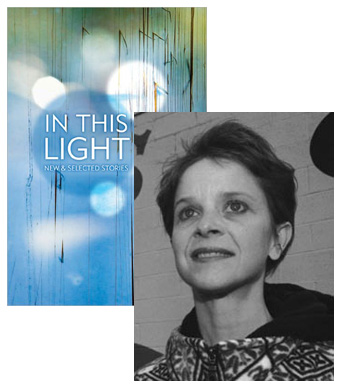What Melanie Rae Thon Found in John Berger’s Pocket

In This Light takes some of the best short stories from Melanie Rae Thon’s first two collections, then adds three previously uncollected pieces—stories where plot, while not completely abandoned, matters less than a totality of experience. The narrators may not be literally unstuck in time, as Billy Pilgrim was in Slaughterhouse-Five, but their narration shifts between past and present without warning, taking on others’ perspectives without hesitation, as the telling of traumatic moments spirals out to encompass entire lives. I’d asked if Thon would be willing to contribute a guest essay to the “Selling Shorts” series, as I do with other short story writers, but instead she’s revealed how an essay by John Berger has changed the way she sees the world—and, I sense, the way she describes the world in her fiction.
There is no happiness like mine. I am reading John Berger’s The Shape of a Pocket, opening a gate, entering the interstices between my own sensory experience and other possible visible orders, perhaps ones “destined for night-birds, reindeer, ferrets, eels, whales… ”
In the fast flicker of daily perception, we sometimes sense the space between two frames, see or hear or smell in ways that give us a glimpse of life beyond our human limitations. Dogs, he says, are the “natural frontier experts of these interstices.” And no wonder! The average dog has over 200 million scent receptors in its nasal folds, compared to a human being’s 5 million. With mobile ears capturing and funneling sound, a dog can locate and identify the source in six-hundredths of a second. They have co-evolved with humans, learned to communicate with us, to seek our companionship and approval, while staying attuned to a river of sensory stimuli we can only begin to imagine. We train them as rescuers and guides; we trust they will save us.
Berger’s elegant essay gives me new appreciation and wonder as I walk along the river with my own beautiful Talia. She bounds ahead of me, a narrow slash of animal. All these years she’s been trying to teach me what she knows about the world. She senses the white hare sitting still in snow, ears twitching. The great horned owl watches us. He’ll kill a dog, a cat, a skunk, a porcupine—rip the hide off a fallen cow, snatch a coyote. Nothing is beyond his grasp: only the whirling hawk or a congregation of crows makes him flee in frenzy.
Talia moves fast when she feels the owl’s golden eyes turn toward her. Her footsteps are thunderous to him, her breath a wild roaring. The hunched bird perches high in snagged branches, ready for a day’s sleep, belly full of other creatures.
The scent of red fox makes Talia crazy. She wants to kill or chase or love him, lie down in the musty maze of his den and hide and wait there. It’s easy enough to find: he’s left a pile of wings and bird bones.
My poverty, my stunning lack of awareness, spares me certain dangers: porcupine and skunk, barbed quills in the face or searing sulfur spray harsh enough to blind me. From the pain of her own experience, Talia knows who to avoid as she runs in the forest.
But fear is just another word for sorrow, and Talia wants to lead me to the dark cave where the black bear has borne two young in her miraculous slumber. Crawling on hands and knees, I could slip into the mouth of the cave and enter the world’s deepest secret. Why do I refuse to follow? The two weigh less than a pound together. I could hold a cub in each palm, let them suckle salty fingers. This is where love begins, with pity and with laughter. Talia could take me to the cave, today, now, this very morning.
Why do I call her name? Why do I resist her?
Sometimes I believe I am fully awakened, that Talia has restored my senses, resurrected me from the cave of human misconception. I believe I hear the mouse tunneling beneath snow just as she does, that I can leap and dig and catch it. Then Talia, my benevolent teacher, leads me a long mile into the woods, to the place where a whitetail deer fell three days ago, where her blood has frozen in snow, and blood and ice are all that’s left of her. Last November Talia did this, and I realized she had sensed the place from the road, followed a trail through trees, as if the frozen blood still trembled.
There is no peace like mine. John Berger has opened the gate. I follow him and Talia through it. In the interstices between the frames of daily experience, the possibilities of perception, the capacity for love and joy and life, are infinite.
16 May 2011 | guest authors |

 Our Endless and Proper Work is my new book with Belt Publishing about starting (and sticking to) a productive writing practice.
Our Endless and Proper Work is my new book with Belt Publishing about starting (and sticking to) a productive writing practice. 
